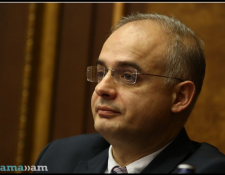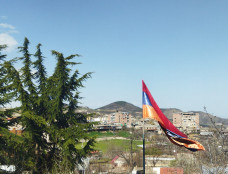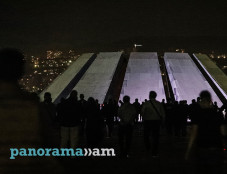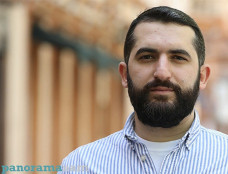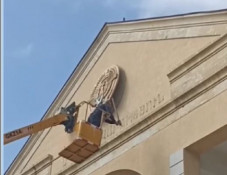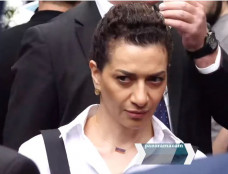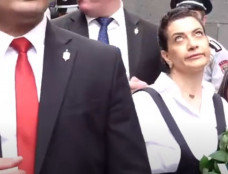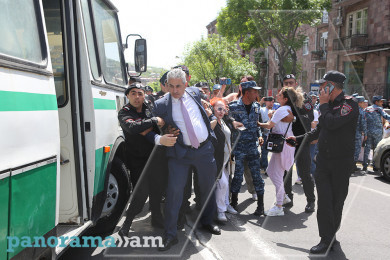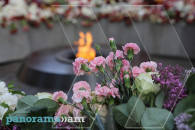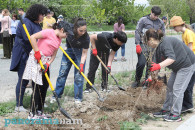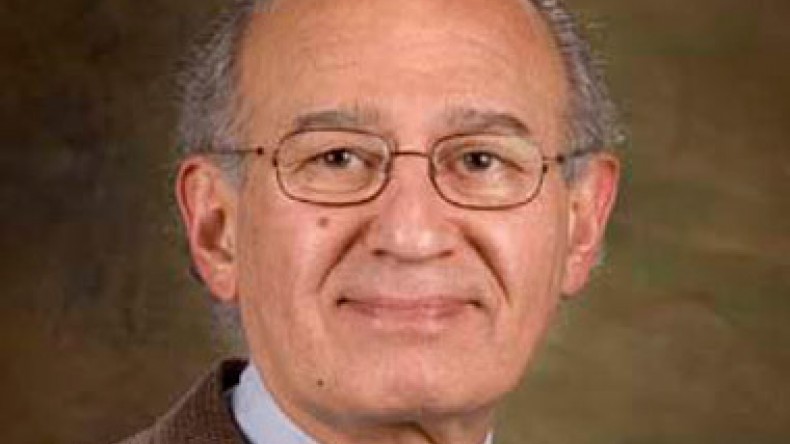
Dickran Kouymjian: For demanding compensations from Turkey we should coordinate our efforts
Panorama.am presents an interview with Dr. Dickran Kouymjian, Haig & Isabel Berberian Professor of Armenian Studies at Fresno University, Emeritus. Dr. Kouymjian expresses his views on the question of demanding reparations from Turkey, on the current policies of Armenia and Turkey as well as on the question of the agendas of the Armenian studies programs.
Dr. Kouymjian, in your articles on the Armenian Genocide you write that the Armenian Republic and the Armenian Church should raise the question of legal compensations from Turkey, with particular regard to Armenian monuments and property. What is the best strategy that Armenia should pursue to this end?
This is the question that I will be addressing at international conference to be held in March 2015 in Paris to commemorate the hundredth anniversary of the Genocide. The answer, as the answers to all questions regarding the Armenian Genocide is complex and susceptible to multi-response very different in kind. The best strategy is one of coordination: Coordination between the Armenian Government and the Diaspora where most of the descendants of the victims live, but also coordination between the Armenian Church and its citizens when it comes to matters of Church property, by which we mean buildings and possessions related to religious element of Armenian life which are the property of the Armenian people administered on consensus by the Church. There has been such coordination, but it has been sporadic, dispersed, and usually invisible. The work has to be separated into individual domains—more thorough accumulation of inventories of churches and other monuments that were affected; the constitution of bodies of experts including jurists and historians that can help articulate not only what the nation and survivors want, but they should be asking for; expert in international affairs that can gage the sometimes rapid changes in questions concerning indemnities for genocide and crimes against humanity, because what might have been a theoretical demand of a few decades ago, or instance recognition of the genocide, may no longer be a vital requisite. These individual spheres of thinking and activity, only a few of which I have cited above, would then have to be coordinated in a dynamic manner susceptible to adapt itself to a constantly shifting world and a regular re-examination of nationals should demand of perpetrators. This kind of action requires both a think-tank type of creativity as well as a concrete hands-on accumulation of data. It is with this kind of solid survey of seize and destroyed property and monuments and a positive strategy toward attaining designated goals, even if changing, can be established.
What is your view regarding the policies of Armenia towards Turkey on the eve of the Armenian genocide centennial (for instance the fact that the President of Armenia has invited the President of Turkey to Armenia to commemorate the Genocide in 2015)?
The Republic of Armenia has been trying to coordinate a general policy, or course of action, with representatives of the diaspora and major Armenian Church leaders. A committee was formed some years ago to this effect; the task is difficult and whatever the outcome, there will be successes and failures as well as praise (perhaps auto-satisfaction) and criticism. It is difficult, at times impossible, to predict the flow of events. The most optimistic thinkers of my generation could have never imagined Armenian independence would be gained so quickly after the slow demise of the Cold War, or could have in any way predicted the fall of the Soviet Union. Even after 1991, none of us predicted or could have predicted in those earlier years that seemed to point to a new and revitalized Armenian nation, that in a short time Armenia would be to a great extent guided by the wishes of oligarchs, whose power seems to increase with time, as is the case in other post-Soviet republics. This situation has created a chasm between the world view of Armenians leading the Republic and Armenians in the diaspora who see civil responsibility differently and who have quite different views about what a democratic state is or should be and about what the rights and the obligations of citizens are, and that means all citizens including elected governmental officials, leaders of the church and other important institution, oligarchs, and not just the great majority of the population, much of which still lives in sub-standard conditions, often in poverty with no way of changing or escaping the system except by leaving the country.
The invitation of President Sargsyan to the President of Turkey to come to Armenia to commemorate the centenary of the Genocide puts pressure on Turkish leadership, it seems to me at first glance, because if Turkey accepts, it will constitute an automatic form of acknowledgement and if it refuses the invitation it would be an awkward response to what should appear to world public opinion as a step as positive as Mr. Erdogan tries to make of his official sorrow for the fate of Armenians in 1915.
What is your view of the policies pursued by Turkey towards Armenia in the context of the Genocide centennial (for instance Turkish Prime Minister offered “condolences” to the victims of 1915)? Do you think there is a sort of change happening in Turkey or do you think it is merely another propaganda ploy of the Turks on the eve of 2015?
The Turkish Prime Minister’s statement, whatever its calculated purpose is, was an unexpected event. However such decisions are often judged in hindsight; we say that the rather hasty positive response to the American sponsored Turkish Armenian Reconciliation Commission (TARC) signed in Geneva in 2004 led nowhere, but gave the appearance that Turkey was behaving reasonably.
As for the question of change happening in Turkey, yes, I believe as anyone who has followed events in Turkey in the past two or three years, since the assassination of Hrant Dink, that a new awareness of what happened in 1915 to the Armenians is occurring at times very rapidly, especially among young intellectuals. At times it goes faster than we would have imagined, at other times it appears to be thwarted by a very clever authoritarian state which commands enormous human and financial resources.
Turkey also represents a very important commercial market; its economy is still growing despite a recent slowing down. It would be foolish not to be realistic, perhaps cynical is a better word, about the amoral attitude of multinational corporations that care little about democratic rights of the citizens of their own counties, let alone of those countries they do business with. Many of the leaders of countries and the heads of their large corporations have no reservations or moral inhibitions when it comes to making money in countries that are dictatorships or engage in practices in theory unacceptable in their own environments. It would be naïve to imagine that the major powers, including western democracies, have any interests that supersede self-interest.
It should, however, be abundantly clear that a change in Turkey toward the Genocide and the Armenian question in general is taking place and will continue almost entirely from within. It will be led as the Turks themselves are in part already driving it. There are already close ties between these enlightened Turkish elites and responsible and dedicated Armenians in both Armenia and the Diaspora; these contacts must be strengthened and broadened and this can only be done by working with Turks individually and collectively.
Dr. Kouymjian, you were the Director of the Armenian Studies Program at Fresno State for many years. What activities is the program pursuing now that you have retired?
In 2008 I formally retired as the first incumbent of the Haig and Isabel Berberian Endowed Professorship of Armenian Studies and the Director of the Armenian Studies Program at the Center for Armenian Studies and definitively returned to my home in Paris. Upon my retirement, my position was separate into two positions. The new Director of the Program is Prof. Barlow Der Mugrdechian, my former student and long time colleague, and as the second holder of the Berberian Chair Prof. Sergio La Porta was chosen after an international search. Together they are continuing the various activities of the Program including a heavy teaching schedule, enhancing it and broadening the outreach of Armenian Studies in the University and in the Fresno community.
Dr. Kouymjian, you have recently published a book titled “Artsakh: Garden of Armenian Arts and Traditions – Karabagh” (2012). To what extent are the contemporary issues that Armenia is facing (such as for instance the question of Nagorno-Karabakh) on the agenda of Armenian chairs in the world, including the program in Fresno?
I did edit along with Prof. Claude Mutafian of Paris, a bilingual, English and French, volume on the arts of Artsakh-Karabagh that has had little circulation outside of France, with virtually no distribution in Armenia or the United States. I hope a second printing will reach a larger audience, because the essays by Patrick Donabedian, François Djindjian, George Bournoutian, Claude Mutafian, and myself are of the highest academic quality, with the latest theories in each of the domains covered and with beautiful illustrations, but in a very accessible language suitable for the any interested reader.
I am no longer one who can comment on the teaching of contemporary issues concerning Armenia except to say in general that though the matter is not ignored in the general courses in modern Armenian history, current topics are presented to students and the public through the Armenian Studies Program Lecture Series at Fresno open to the students and the public at large. Important experts, sometimes scholars, other times individuals influential in international affairs and in conditions in Armenia as well as Turkey and the diaspora, are invited to come to Fresno to speak. Also at the university, due to an important endowment, we initiated the Henry Kazan Visiting Professorship in Modern Armenian and Genocide Studies, by which a distinguish scholar is chosen from among candidates to be in residence on campus for one semester for a specific course on some aspect of the Genocide and to offer three public lectures to the community around a central topic. In general, Armenian studies programs have a curriculum centered around history, language and literature, and at times Armenian art. Those programs that specialized in the modern and contemporary history of Armenia, such as UCLA, Berkeley, Boston University or University of Michigan, both at Ann Arbor and the Dearborn campus, are more likely to offer an occasional course on contemporary issues.
Armenian studies as it developed in Europe in the nineteenth and twentieth centuries was concentrated on ancient and medieval history, philology and classical Armenian. This tradition is still very important in both European universities
and places like Harvard and until recently Columbia. For modern studies in the U.S., but also in Europe, the Genocide remains the focus and to a much lesser extent contemporary geopolitical investigation.
Dr. Kouymjian, thank you very much for the interview.
By Nvard Chalikyan
Newsfeed
Videos





